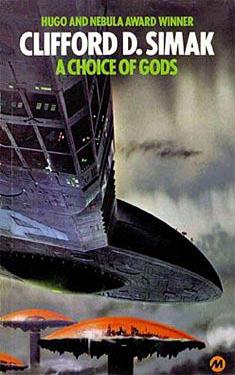Clifford D. Simak
Completed 12/24/2014, Reviewed 12/27/2014
5 stars
I first fell in love with Clifford Simak while reading his
award winning novelette, “The Big Front Yard”.
Two novels later, I am still enamored with the way he juxtaposes rural
America and science fiction. In this
novel, Simak’s characters are the few remaining humans on earth after a
mysterious rapture has taken most people to another planet. Of the remaining few, most have developed
instantaneous interstellar thought-travel, and all are nearly immortal. Only Jason
and Martha Whitney, a small tribe of Native Americans, and some scattered
others are left to a world that has slowly returned to a nearly pre-modern
human state, except for the robots. Now
after 5000 years, the raptured masses have rediscovered their planet of origin
and want to return, threatening the idyllic life of the remaining few, and the
Eden-like state to which the Earth has returned.
Most technology has decayed, except for the huge population
of nearly indestructible robots. The
 pre-rapture population created the robots to serve humans. Bereft of their prime object, they are left
to figure out for themselves how to satisfy their primary programming. The Whitneys have a few robots to help them
farm the land. One small group live in a
monastery, reviewing theological writings in search of religious truths left
unanswered by humans. The Native
Americans eschew the robots, reclaiming their ancestral subsistence lifestyle. The rest of the robots live in the decaying
metropolitan remnants, searching for meaning.
pre-rapture population created the robots to serve humans. Bereft of their prime object, they are left
to figure out for themselves how to satisfy their primary programming. The Whitneys have a few robots to help them
farm the land. One small group live in a
monastery, reviewing theological writings in search of religious truths left
unanswered by humans. The Native
Americans eschew the robots, reclaiming their ancestral subsistence lifestyle. The rest of the robots live in the decaying
metropolitan remnants, searching for meaning.
What I love best about Simak’s work is the way he uses prose
to convey the peaceful existence of his characters in their rural settings. This is not a long a book, so there are not
multipage odes to rustic life. It is
simply the way he advances the plot through walks in the forests and along
rivers that create the sylvan mood that puts the reader into a state of calm. When the prospect of billions of returning
humans nears, it not only threatens the characters, but the comforting state
the reader has reached through the prose.
There is only one alien in this story, but it epitomizes
what I have loved so much of the few of Simak’s work that I’ve read. His aliens are not anthropomorphized earth
animals, like Card’s piggies in Speaker for the Dead, Niven’s Ringworld horse and tiger creatures, or
Leiber’s cringe-worthy Tigerishka of The Wanderer. They are always truly weird. Here our one alien most closely resembles a
can of worms. I also really like how
Simak makes mention of the inability to communicate with aliens. It’s not just language, but the frame of
reference for language. While it’s great
that we can communicate with other sentient species in most science fiction,
the tack Simak takes seems more plausible, at least from the perspective of
early contact.
Most importantly, I admire the theme of the novel. Left unchecked, humanity will deplete the Earth
of all its resources. Once removed,
nature can reclaim much but not all of what it lost. A small population can live in harmony with
nature, though it is nice to have some robotic help. Simak loved his rural Wisconsin roots and
conveys that admirably in his work. It
recalls for me my own desire to live in a small town near natural wonders,
despite the practical problems of high cost of living and low wages, just to
have that experience that we give up in pursuit of the almighty dollar.
I give this book 5 stars out of 5. Though it could have been longer, with more
development of secondary characters, it is a beautiful work with meaning and
message that tugs at the heart of who and where I would like to be.
Simak is one (of many) classic authors I have yet to read. I do have at least one of his books downstairs on the paperback shelves.
ReplyDeleteVery good review, this one sounds good.
Thanks Carl. There is just so much to read: the new, the classic, the literary, the obscure. I discovered Simak while pursuing the Hugos. Fortunately, I've also discovered Delaney and Silverberg. And at some point, I need to read Wells and Verne before they take away my nerd card.
DeleteI read Invisible Man many years ago. Don't remember much of it, but do remember I liked it. A few years back I read 20,000 Leagues Under the Sea and while parts of it were engaging, I found it to be quite a slog to get through. It could have just been where my mind was at at the time, but it was tough going.
ReplyDeleteAn excellent review. I have read many short stories, "City", and "Way Station" by Simak. I have some of his novels in my very high stack of TBR books. I will have to add this one to the stack.
ReplyDeleteThanks Jim. My TBR list got lots longer when I discovered which branch of my county library system was the resting place of the works of the classic authors, including Simak.
Delete